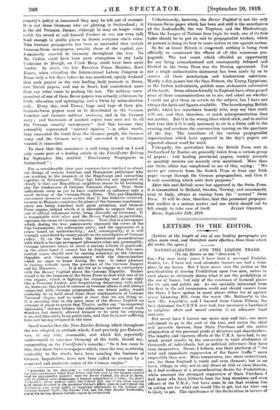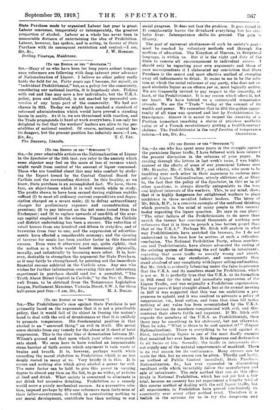LETTERS TO THE EDITOR.
[Letters of the length of one of our leading paragraphs are often more read, and therefore more effective, than those which fill treble the space.]
NATIONALIZATION AND THE LIQUOR. TRADE. (To um Emma or rex " SPECTA2013."3 SIR,—For over forty years I have been a personal Prohibi- tionist, i.e., I have not used alcoholic liquors nor had a wine- glass in my house. But I have never seen the justice or the practicability of forcing Prohibition upon free men, unless in such places as obviously desire what is not the prohibition of the use of liquor, but only of the existence of licensed places for its sale and public use. As one specially interested from the first in the aid temperance could and should receive from the State, I have spoken in many places either for or against every Licensing Bill, from the worst (Mr. Balfour's) to the best (Mr. Asquith's), and I learned from Canon Ellison, the best chairman the C.E.T.S. ever had, how necessary a handmaid to religious effort and moral suasion is an adequate legal measure.
But never have I known one more sane and fair, one more calculated to go to the root of the tree, and excise the chief evil • parasite thereon, than State Purchase and the entire elimination of the personal profit of directors and shareholders. The lengthy and vigorous efforts of the U.B.A. have had, to my mind, grand results in the conversion to total abstinence of thousands of individuals, but as political reformers they have been inoperative. Never, I believe, was their platform of " the total and immediate suppression of the liquor traffic " more impossible than now. More temperance, yes; more restrictions, yes; for these England is ready and even clamant; but in no town, village, or city, not in any street or club or class therein, do I find evidence of a preponderating desire for Prohibition; while amongst the strongest supporters of State Purchase I find many who have hitherto been for long members and even officers of the U.K-A., but have come to see that wisdom lies in asking not for what one would like to get, but for what one is likely to get. The significance of the declaration in favour of
State Purchase made by organized Labour last year is great. Labour consumes, temperately or intemperately, the greatest proportion of alcohol. Labour as a whole has never been in measurable distance of entertaining the idea of Prohibition. Labour, however, has spoken, and is acting, in favour of State Purchase with its consequent restriction and control.—I am, Sir, &c., J. W. Hozmar. Betting Vicarage, Maidstone.







































 Previous page
Previous page